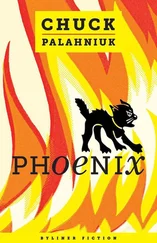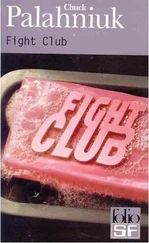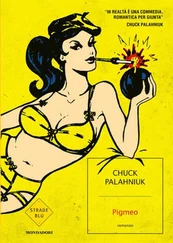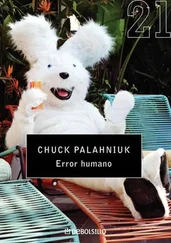Shane and my folks were in the dining room, me, I was behind my bedroom door. My clothes, most of my school clothes were outside on the clothesline. Inside, my father said, “It’s not strep throat you’ve got, mister, and we’d like to know where you’ve been and what you’ve been up to.”
“Drugs,” my mom said, “we could deal with.”
Shane never said a word. His face still shiny and creased with scars.
“Teenage pregnancy,” my mom said, “we could deal with.”
Not one word.
“Dr. Peterson,” she said. “He said there’s just about only one way you could get the disease the way you have it, but I told him, no, not our child, not you, Shane.”
My father said, “We called Coach Ludlow, and he said you dropped basketball two months ago.”
“You’ll need to go down to the county health department tomorrow,” my mom said.
“Tonight,” my father said, “we want you out of here.”
Our father.
These same people being so good and kind and caring and involved, these same people finding identity and personal fulfillment in the fight on the front lines for equality and personal dignity and equal rights for their dead son, these are the same people I hear yelling through my bedroom door.
“We don’t know what kind of filthy diseases you’re bringing into this house, mister, but you can just find another place to sleep tonight.”
I remember I wanted to go out and get my clothes, iron them, fold them, and put them away.
Give me any sense of control.
Flash.
I remember how the front door just opened and shut, it didn’t slam. With the light on in my room, all I could see was myself reflected in my bedroom window. When I turned out the light, there was Shane, standing just outside the window, looking in at me, his face all monster-movie hacked and distorted, dark and hard from the hairspray blowup.
Give me terror.
Flash.
He didn’t ever smoke that I knew about, but he lit a match and put it to a cigarette in his mouth. He knocked on the window.
He said, “Hey, let me in.”
Give me denial.
He said, “Hey, it’s cold.”
Give me ignorance.
I turned on the bedroom light so I could only see myself in the window. Then I shut the curtains. I never saw Shane again.
Tonight, with the lights off, with the curtains shut and the front door locked, with Shane gone except for the ghost of him, I ask, “What parade?”
My mom says, “It’s the Gay Pride Parade.”
My dad says, “We’re marching with PFLAG.”
And they’d like me to march with them. They’d like me to sit here in the dark and pretend it’s the outside world we’re hiding from. It’s some hateful stranger that’s going to come get us in the night. It’s some alien fatal sex disease. They’d like to think it’s some bigoted homophobe they’re terrified of. It’s not any of it their fault. They’d like me to think I have something to make up for.
I did not throw away that can of hairspray. All I did was turn out the bedroom lights. Then there were the fire engines coming in the distance. There was orange flashing across the outside of my curtains, and when I got out of bed to look, there were my school clothes on fire. Hanging dry on the clothesline and layered with air. Dresses and jumpers and pants and blouses, all of them blazing and coming apart in the breeze. In a few seconds, everything I loved, gone.
Flash.
Jump ahead a few years to me being grown up and moving out. Give me a new start.
Jump to one night, somebody calling from a pay phone to ask my folks, were they the parents of Shane McFarland? My parents saying, maybe . The caller won’t say where, but he says Shane is dead.
A voice behind the caller saying, Tell them the rest.
Another voice behind the caller saying, Tell them Miss Shane hated their hateful guts and her last words were: This isn’t over yet, not by a long shot . Then somebody laughing.
Jump to us alone here in the dark with a casserole.
My father says, “So, honey, will you march with your mother and me?”
My mom says, “It would mean so much for gay rights.”
Give me courage.
Flash.
Give me tolerance.
Flash.
Give me wisdom.
Flash.
Jump to the truth. And I say:
“No.”
Now, Please, Jump to Chapter Thirty-Three
 here you’re supposed to be is Spitefield Park, a hundred acres on the edge of town. If it were an oil well, you’d call Spitefield a gusher. It’s a hundred acres of nowhere that Daisy turned into a gold mine. It’s world-famous, in a quiet sort of way. The place makes money hand over fist, and more or less takes care of itself. Spitefield is a cemetery. A boneyard. What gives it a leg up on its competitors is Lady Daisy’s liberal epitaph policy. Other cemeteries, bone orchards, what have you, they’re run by proper world religions, obsessed with decorum. Daisy’s competition wasn’t ever going to let you carve on your tombstone the words:
here you’re supposed to be is Spitefield Park, a hundred acres on the edge of town. If it were an oil well, you’d call Spitefield a gusher. It’s a hundred acres of nowhere that Daisy turned into a gold mine. It’s world-famous, in a quiet sort of way. The place makes money hand over fist, and more or less takes care of itself. Spitefield is a cemetery. A boneyard. What gives it a leg up on its competitors is Lady Daisy’s liberal epitaph policy. Other cemeteries, bone orchards, what have you, they’re run by proper world religions, obsessed with decorum. Daisy’s competition wasn’t ever going to let you carve on your tombstone the words:
So I’m dead. It beats working retail at Christmas
At Spitefield Park, you can carve whatever sentiments you want. Mostly people buy graves there for their loved ones—using that term strictly as a euphemism. They pay huge sums for extra-large grave markers, granite billboards, really, that say things like:
I was a shitty husband and father. I couldn’t die fast enough
Guilt and sadness sell a lot of big-ticket caskets. Mausoleums. Solid mahogany and burnished-brass handles and great, huge wreathes of carnations. But anger …revenge …that’s where the big spenders flock. The mourners, when they go to plant Grandma under a headstone that says:
Cunt
…they don’t care if you mow the grass and maintain the lovely landscaping. Daisy made her original fortune from this type of payback. These survivors don’t care if homeless people camp on the grave or off-leash dogs defecate there. Rambunctious teenagers go marauding on Halloween, pushing over a few tombstones, and nobody will raise a fuss. People who inter their dead at Spitefield Park, they never come back for a second look. They never bring flowers or miniature decorated trees on Christmas or bunches of helium balloons to bob and flutter their flashy Mylar in celebration of a dead person’s birthday. Oh, but the tourists come. The you-gotta-see-this local hipsters bring their snarky tourist friends for a laugh. For an I-can’t-believe-somebody-did-this tour. Art students snap the kind of ironic pictures you’d expect. No bereaved survivors check for correct spelling or dates. Sometimes they pay extra—sometimes a lot extra, that’s where the pure profit is: the add-on expenses—to get names misspelled. Letters transposed. Freudian slips chiseled into marble.
She sleeps with the angles
With no overhead, the profit margin is stupendous. With such an income stream Daisy St. Patience need do nothing except count her money, and it’s this cash flow from Spitefield Park that gives her some elbow room. Daisy can take her own sweet time to assemble a top-notch stable. Daisy St. Patience: Loving Do-Gooder. Empathetic Hand-Holder.
It was Daisy who went to the Blue Girls everyone had forgotten about. Candy-Striper Daisy volunteered to bring cheer to those living nightmares consigned by next-of-kin to state hospitals, to locked wards, to watching television with their runny eyes for a lifetime on account of having a lumpy head the size of a microwave oven carved from gouda cheese. The Elephant Women . Those twisted, shambling gals with faces like torched Halloween masks. Their smiles like lumpy, red, knobby pomegranates turned inside out. The Born-That-Way girls. The In-a-Terrible-Accident girls, and the There-But-for-the-Grace-of-God girls. Like no one you’d want to meet in a dark alley late at night. Those horror movie ladies with heartbreaking names like “Fern” and “Penny,” Daisy sought them out and mentored them. These young cripples who crawled toward her on legs like boneless tentacles, and looked at her with their blue eyes set in faces like blood-red cauliflower, for them Lady Daisy lifted the hem of her own veil like a stage curtain. This is what Daisy St. Patience did after the end of the end of the last chapter. She did not don a veil and become a belly dancer. Nor did she take up playing ice hockey as a lifetime excuse to wear a goalie mask. Lady Daisy went to these wretched young ladies. Girls who, from their faces, you’d scarcely guess were still human. Daisy St. Patience reached out to gently, warmly, passionately grasp hold of their hands or claws or flippers, and she said, “I’d like to propose a partnership …”
Читать дальше
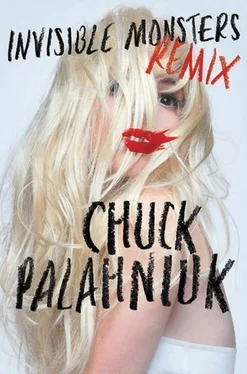
 here you’re supposed to be is Spitefield Park, a hundred acres on the edge of town. If it were an oil well, you’d call Spitefield a gusher. It’s a hundred acres of nowhere that Daisy turned into a gold mine. It’s world-famous, in a quiet sort of way. The place makes money hand over fist, and more or less takes care of itself. Spitefield is a cemetery. A boneyard. What gives it a leg up on its competitors is Lady Daisy’s liberal epitaph policy. Other cemeteries, bone orchards, what have you, they’re run by proper world religions, obsessed with decorum. Daisy’s competition wasn’t ever going to let you carve on your tombstone the words:
here you’re supposed to be is Spitefield Park, a hundred acres on the edge of town. If it were an oil well, you’d call Spitefield a gusher. It’s a hundred acres of nowhere that Daisy turned into a gold mine. It’s world-famous, in a quiet sort of way. The place makes money hand over fist, and more or less takes care of itself. Spitefield is a cemetery. A boneyard. What gives it a leg up on its competitors is Lady Daisy’s liberal epitaph policy. Other cemeteries, bone orchards, what have you, they’re run by proper world religions, obsessed with decorum. Daisy’s competition wasn’t ever going to let you carve on your tombstone the words:
